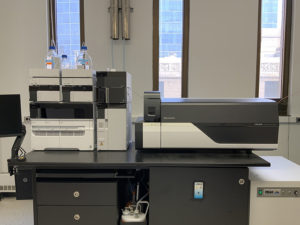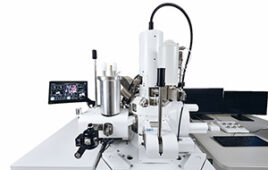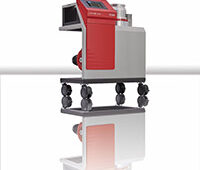 Shimadzu Scientific Instruments (Shimadzu) and Washington University School of Medicine in St. Louis have entered into a joint research agreement to apply mass spectrometry technology toward the development of tools to quantitate nicotinamide mononucleotide (NMN) and related compounds in biological specimens. The key objective of the collaboration, with Professor Shin-ichiro Imai, M.D., Ph.D., in the School of Medicine’s Departments of Developmental Biology and Medicine, will be to deepen the understanding of the systemic regulation of aging and longevity in mammals.
Shimadzu Scientific Instruments (Shimadzu) and Washington University School of Medicine in St. Louis have entered into a joint research agreement to apply mass spectrometry technology toward the development of tools to quantitate nicotinamide mononucleotide (NMN) and related compounds in biological specimens. The key objective of the collaboration, with Professor Shin-ichiro Imai, M.D., Ph.D., in the School of Medicine’s Departments of Developmental Biology and Medicine, will be to deepen the understanding of the systemic regulation of aging and longevity in mammals.
NMN is a key nicotinamide adenine dinucleotide (NAD+) intermediate in the major NAD+ biosynthetic pathway. In 2011, Dr. Imai’s lab demonstrated that supplementation of NMN dramatically ameliorates dysfunctions in glucose metabolism in high fat diet- or aging-induced type 2 diabetic model mice. In 2016, Dr. Imai’s team also showed that in healthy aging mice, NMN, with no obvious toxicity or deleterious effects, suppresses age-associated body weight gain, enhances energy metabolism, promotes physical activity, enhances insulin sensitivity and plasma lipid profiles, and ameliorates eye function and other age-associated pathophysiology. Most recently, the team led by Drs. Samuel Klein and Imai at Washington University School of Medicine, published results in Science1 from the first clinical trial on NMN, demonstrating that NMN significantly improves insulin sensitivity and signaling in skeletal muscle. While additional trials are necessary, the new findings suggest that NMN has preventive and therapeutic potential for age-associated functional decline and disease conditions in humans.
“Although NMN and NMN-related compounds in mice can be quantified using LC-UV, the concentrations are one or more orders lower in human blood. LC-MS would be necessary to accurately quantify NMN in human blood,” said Masayuki Nishimura, PhD, director of New Strategy Department, Shimadzu Scientific Instruments. “This collaboration will integrate WUSM’s leading anti-aging researchers and clinical resources with Shimadzu’s LC-MS technologies to establish a reliable quantitation method of NMN and NMN-related compounds in biological samples. As a global leader in aging and longevity research, Prof. Imai is an ideal collaborator to advance the application of mass spectrometry in anti-aging research.”
“In collaboration with Shimadzu, we want to develop an accurate, reproducible, mass spectrometry-driven methodology for NMN and NMN-related compounds in biological samples. This work is critical for understanding the therapeutic potential of NMN and related compounds that will be further evaluated in clinical trials,” said Dr. Imai.
Shimadzu will direct this collaboration through its New Strategy Department in Columbia, Md., and at the Shimadzu Corporation headquarters in Kyoto, Japan.





Tell Us What You Think!